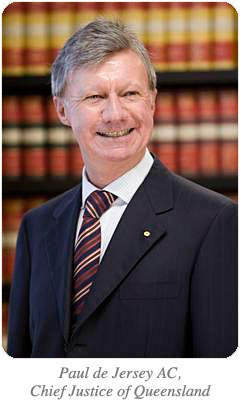 THE CHIEF JUSTICE
THE CHIEF JUSTICE
Ladies and gentlemen, we are going to acknowledge our gratitude for the judicial contribution of our former colleague, the Honourable Peter David Connolly CBE CSI who died on 2nd May 2009.
In acknowledging his singular judicial achievement, we express gratitude now on behalf of the people of Queensland to the members of his family, his children Claudia Jane, David, John and Zoe, and his long-term companion Mrs Paula Chandler.
I welcome the Honourable Attorney-General, heads and members of other Courts and tribunals, retired judges, and confirm that all judges of this Court, though some cannot be here today, would wish to join me in these following observations.
Four former judges have particularly requested me to do so; the Honourable Alan Demack and the Honourable Geoff Davies, together with the Honourable Bruce McPherson and the Honourable Glen Williams, both of whom are presently sitting in the Court of Appeal on the Solomon Islands.
Peter Connolly was appointed to the Supreme Court on the 31st of October 1977 and remained a judge until his retirement on the 12th of September 1990, 17 days short of his 70th birthday.
Mr Justice Connolly came to the Court from a most distinguished prior career. He matriculated from St Joseph’s College in 1936 with the singular achievement of being bothDux and Head Boy. In 1948, he graduated from the University of Queensland as Bachelor of Laws with First Class Honours and was awarded a University Medal in an era when they were but sparingly accorded.
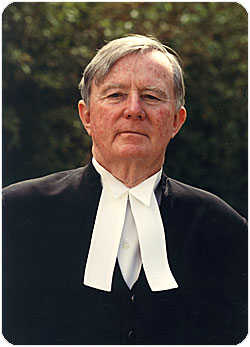 His brilliant career at the Bar spanned 28 years from 1949 and was characterised by intellectual and lawyerly eminence. Apart from a host of extringent commitments of Parliament, the Military, the Arts, he served as President of the Bar Association of Queensland, of the Australian Bar Association and of the Law Council of Australia.
His brilliant career at the Bar spanned 28 years from 1949 and was characterised by intellectual and lawyerly eminence. Apart from a host of extringent commitments of Parliament, the Military, the Arts, he served as President of the Bar Association of Queensland, of the Australian Bar Association and of the Law Council of Australia.
The year before his appointment as a judge, he was created Commander of the Order of the British Empire for his distinguished service to the legal profession. As well as serving as Judge of the Supreme Court of Queensland, Peter Connolly served from 1982 to 1994 as a Justice of Appeal in the Solomon Islands and as President for the last seven of those years, and from 1991 to 1998 as a Justice of Appeal in the Republic of Kiribati. His post nominals CSI refer to the Cross of the Solomon Islands. Extrajudicially, he served in 1996 to 1997 as Chair of the Connolly-Ryan Commission of Inquiry into the Criminal Justice Commission.
As a judge, Peter Connolly applied his high intellect, daunting command of legal principle and acute understanding of Court craft to the great benefit of litigants and the institution of the Court. He produced a raft of polished judgments not infrequently still quoted today. He abhorred laxity in legal and judicial reasoning and deplored any unnecessary dissent into subjectivity or so-called judicial activism or creativity. He was interested in the efficiency of litigation decrying sometimes volubly any wastage of time or other resources and producing reserved judgments without delay. He was an unswerving supporter of the institution of the Court and of the legal profession, and indeed, the Federal system of government of which he had an acute understanding.
As first speaker this morning, I have briefly focused on Peter Connolly’s judicial contribution. That was, however, but one facet of a human being of extraordinarily diverse talents and achievements.
His passing marks the departure of the last of the judges of the Supreme Court of Queensland who served in the Second World War which Peter Connolly accomplished with conspicuous gallantry. At lest it be pointed out, he was a greatly successful Queens Counsel, may be it should be recorded his interest in commensurately high fees was minimal.
As with his military career in particular, Peter Connolly’s legacy for the judicial government of Queensland was and is of heroic proportion. In noting his passing with great regret,we extend our sympathy to his children and Mrs Chandler and we are most grateful for their presence here today.
THE ATTORNEY-GENERAL
May it please the Court, I begin by acknowledging the traditional owners of the land where this Court is convened and pay my respects to their Elders, both past and present.
We gather here today to acknowledge the judicial career of the Honourable Peter David Connolly CBE CSI, who passed away on the 2nd of May this year. At the outset, I also wish to particularly acknowledge members of Peter Connolly’s family, his children, Claudia Jane, David, John and Zoe, and his partner, Mrs Paula Chandler.
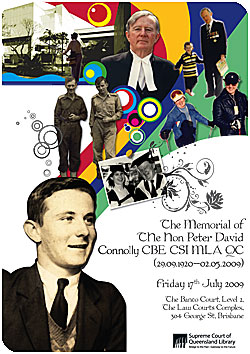 Described as a Supreme Court Judge, politician and soldier, Peter Connolly had a diverse and impressive life dedicated to public service. Justice Connolly’s distinguished career began upon his return to Australia after service overseas in the Middle East, the Pacific and Southeast Asia during the Second World War. Peter Connolly returned to university in 1946 and studied law. He graduated with First Class Honours in 1948 winning the University Medal in Law. Before his graduation, he was appointed a lecturer in Constitutional Law at the University of Queensland. He was admitted to the Queensland Bar in 1949, and took silk in 1963.
Described as a Supreme Court Judge, politician and soldier, Peter Connolly had a diverse and impressive life dedicated to public service. Justice Connolly’s distinguished career began upon his return to Australia after service overseas in the Middle East, the Pacific and Southeast Asia during the Second World War. Peter Connolly returned to university in 1946 and studied law. He graduated with First Class Honours in 1948 winning the University Medal in Law. Before his graduation, he was appointed a lecturer in Constitutional Law at the University of Queensland. He was admitted to the Queensland Bar in 1949, and took silk in 1963.
Justice Connolly held the positions of President of the Bar Association of Queensland from 1967 to 1970, President of the Australian Bar Association from 1967 to 1968 and President of the Law Council of Australia from 1968 to 1970.
He also served overseas as a Justice of Appeal in the Republic of Kiribati and in the Solomon Islands.
Peter Connolly was appointed a Justice of the Supreme Court of Queensland in 1977 and served in that capacity for 13 years.
In 1976, he was made a Commander of the Order of the British Empire for his service to the legal profession.
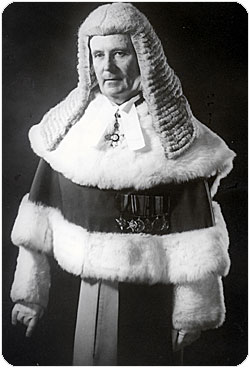
He was widely regarded as having a formidable intellect, and was a traditional black letter lawyer from the old-school of strict, but unwaveringly fair judicial officers.
Peter Connolly’s erudite crystallisations of complex legal arguments are still utilised in our Courts, nearly 20 years after his retirement.
Prior to his passing, Justice Connolly was the last living Queensland Supreme Court judge to have served in the Second World War. He served between 1940 and 1946 in the Second Australian Imperial Force in the 2/12th Australian Infantry Battalion.
Justice Connolly saw service in the Middle East from 1940 to 1942; in New Guinea from 1942 to 1944; and in Morotai and Borneo in 1945 and 1946.
Upon his appointment to the Bench, Justice Connolly mentioned Sir Frederick Chilton as major influence on him, and one of the reasons he aspired to become a lawyer. Sir Frederick Chilton was a Sydney solicitor who commanded the 18th Brigade in which Justice Connolly served.
As Peter Connolly himself said, “I would first like to speak of somebody whose name is probably unknown to everybody here, and that is Sir Frederick Chilton, who commanded the 18th Brigade in which I had the honour to serve. He was a Sydney solicitor and he, more than anyone else, influenced me into the profession. He was a model of civilised behaviour, and I remember his displaying at the end of the War at Balikpapan a distaste for an attitude of petty vengefulness towards the defeated enemy, which was being actively encouraged by his superiors. It was the fashion, but he set his face against it.”
Peter Connolly continued his service upon returning to Australia, becoming Commanding Officer of the Queensland University Regiment; the 9th Battalion Royal Queensland Regiment; and of the Command and Staff Training Unit.
He was also elected to the Queensland Parliament as the State Member for Kurilpa from 1957 to 1960.
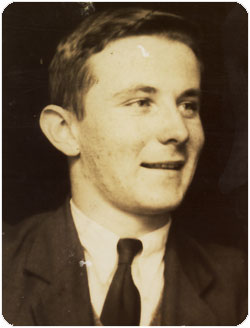 Through his military service, his election as a Member of the Queensland Parliament, and his distinguished judicial career, Peter Connolly’s life was one of committed public service.
Through his military service, his election as a Member of the Queensland Parliament, and his distinguished judicial career, Peter Connolly’s life was one of committed public service.
Peter Connolly also supported a large number of community organisations, mostly associated with the Arts. He was a Trustee of the Queensland Art Gallery from 1959 to 1983, and served as Vice President and President. As President, he said the Queensland Art Gallery should serve all people in Queensland, not just those in Brisbane.
He also served as a Director of the Queensland Opera Company, Queensland Convenor of the Committee on Education and the Arts in 1976 and 1977 and was President of Musica Viva Queensland.
I will conclude with a quote from Peter Connolly himself, which he made at his retirement valedictory ceremony. His words still ring true today, “Long before we become judges we are answerable to our conscience and to the law, but to no man. The characteristics of the profession are independence and individualism. We are, in the classic phrase, servants of all, yet of none.”
THE PRESIDENT OF THE BAR ASSOCIATION
There is a story about the judge. It was in 1939 and he was studying Modern Languages at the University of Queensland. His generation knew towards the end of that year at the latest that there was a probability that they would have to fight and so knew that they faced the possibility of being killed. Having analysed the relevant facts, he had determined upon being a pacifist when his good friend, Brian Robin, confronted him. The conversation would have gone something like this.
Robin: “Connolly, you’ve fooled around long enough with this sort of nonsense. You’d better join the Army.”
The Judge: “But I don’t want to.”
Robin: “Well, of course you don’t. Nobody does.”
The Judge: “I don’t understand. You’ll have to explain it to me, what do you mean?”
Robin: “Nobody does. Everybody has to.”
Immediately the judge enlisted. The story, I submit, illustrates four of the judge’s qualities: his courage; his open mindedness with the consequent capacity to change his mind when confronted by some new aspect of a problem; his judgment and; his decisiveness. All of these were essential ingredients of the recipe which made him such a fine judge and they were ones which were on display in his Court whenever he sat.
His first experience of the legal process came long before he had completed his law degree. It was as the junior officer serving on a Court marshal in Borneo or New Guinea, I think. The offence bordered on the serious and in the ordinary course would probably have resulted in the soldier being drummed out of the service. But a long time had elapsed since the commission of the offence and in the interim the accused had performed commendably on some truly dangerous missions. With no knowledge of military or any other law, the judge reasoned that the Army had condoned his offence. The Court included an experienced and knowledgeable lawyer who demonstrated by argument that this was not a principle known to the law. Despite this, the judge’s advocacy carried the day, with the Court determining to acquit.
While those who knew the judge well would have no doubt that this sense of fairness came to be tempered with his appreciation of the importance of the application of principle, equally, they would be confident that the judge’s decisions were always founded on a sense of justice.
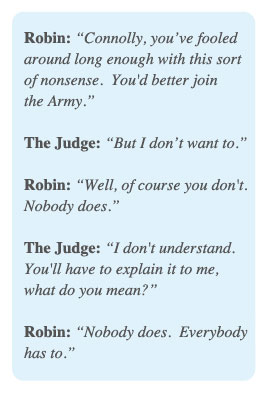
So, equipped with courage, an open and inquiring mind, the capacity for being decisive, a fine judgment, a good sense of what is fair and the intellect described by others, it is little wonder that Mr Justice Connolly came to be the very fine judge he was.
Others have spoken admiringly and affectionately of Peter Connolly the man, but from the Bar’s own perspective, there is little more this gentleman could have done to earn our gratitude and respect.
When he came to the Bar in approximately 1948 or 1949, there was no system of pupillage and he made his own way in the world moving to Rockhampton immediately in the hope of improving his prospects of earning his keep. Despite this lack of formal support, or perhaps because of it, throughout his career at the Bar he was a great teacher who was unstintingly generous with his time in giving advice and encouragement to other barristers. He also gave much time to the affairs of the Association.
When he added the Presidency of the Law Council of Australia to his terms as President of our Bar and of the Australian Bar Association, Peter Connolly became the first to hitch this troika to his sleigh.
The barristers of Queensland lament the passing of the Honourable Mr Justice Peter Connolly and extend their sincere sympathies to Claudia Jane, Zoe, David, John and to Mrs Chandler.
THE PRESIDENT OF THE LAW SOCIETY
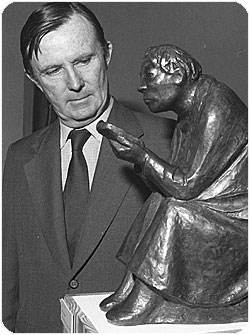 I‘d like to acknowledge for the record, your Honours, those people here today who are joining with us in the celebration of the life of Peter Connolly. I’d like to acknowledge that Justice Susan Kiefel of the High Court is here; Justice Spender; Justice Dowsett; Justice Greenwood; and Justice Logan and Justice O’Reilly, both members of the Federal and Family Courts; Chief Judge Patsy Wolfe, his Honour Judge Brabazon; his Honour Judge McGill, his Honour Judge Shanahan, Judge Irwin, Judge Kingham and Judge Andrews SC. From the Magistrates Court, his Honour Judge Brendan Butler AM, Chief Magistrate; Noel Nunan and Magistrate Linda Bradford-Morgan.
I‘d like to acknowledge for the record, your Honours, those people here today who are joining with us in the celebration of the life of Peter Connolly. I’d like to acknowledge that Justice Susan Kiefel of the High Court is here; Justice Spender; Justice Dowsett; Justice Greenwood; and Justice Logan and Justice O’Reilly, both members of the Federal and Family Courts; Chief Judge Patsy Wolfe, his Honour Judge Brabazon; his Honour Judge McGill, his Honour Judge Shanahan, Judge Irwin, Judge Kingham and Judge Andrews SC. From the Magistrates Court, his Honour Judge Brendan Butler AM, Chief Magistrate; Noel Nunan and Magistrate Linda Bradford-Morgan.
Also, I wish to acknowledge the retired judges here today as well: the Honourable CW Pincus QC; the Honourable WC Lee QC; the Honourable JWB Helman and Mrs Helman as well as Mrs Jackie McPherson.
It seems that, to use the parlance, perhaps that the Honourable Peter Connolly would have heard in the Army, so I think I am what is commonly referred to as Tail-end Charlie. So that I have, as a young articled clerk, some of my own perspectives when it comes to being introduced to Peter Connolly, but I might leave that until later.
I represent the solicitor graduate profession and I indeed acknowledge the contribution of Peter Connolly has made to this profession first as a member of the Bar and, secondly, as a judicial officer of this Honourable Court.
I’d respectfully submit that Peter Connolly was a man of all seasons, a distinguished soldier, a State politician, a respected barrister, a quoted judge and a vocal legal commentator.
Throughout his career, not all of them, in the early days as a barrister in Rockhampton and then Brisbane, through to taking silk in 1963 and his appointment to the Supreme Court between 1977 and 1990, Peter Connolly was always very much respected. His insistence on good argument, a rigorous application for the rules and a fulsome knowledge of the subject was certainly well known throughout the solicitor’s branch of this profession.
It’s been said that one of the earliest briefs that her Honour Justice Susan Kiefel had as a young barrister was the curious job of settling a brief for then Peter Connolly QC as he then was. The solicitors in question were anxious that he would reject their brief, it was not prepared legitimately and with high expectations as was expected when one briefed Peter Connolly. It was quite a mark of respect to Peter Connolly as counsel that firms would even consider paying another barrister to prepare briefing material on behalf of their firm.
My own reference is the fact that I, as a young articled clerk, I was passing Peter Connolly’s chambers only to be greeted by a scurrying articled clerk with a brief following him, so I assumed that was the reason why Justice Kiefel was subsequently engaged.
Another anecdotal moment I had was again back in the early 70s when I was instructed by my principal to accompany probably what we generally refer to as spiffs to the Executive Building on the ground floor where Peter Connolly was actually involved in a Commission. My memory is vague, but it was something to do with buildings societies and the fact that there are some people in that area who were being unfair, and I must say, the examination of those witnesses by Peter Connolly was something that you would never forget.
I’m told that appearing before him as an articled clerk or solicitor, even seeking an adjournment was quite a memorable experience. He was, in practical terms, a pioneer of judicial case management and he was not willing to simply pass a matter over to the next callover without an excellent reason, a well developed argument and a sound basis in the Supreme Court Rules were necessary to get past an adjournment.
He constantly challenged the legal profession to refine its skills in identifying relevant material and in making concise and informed observations within the strong framework of the Rules of Practice of which he demonstrated a mastery.
As a lawyer and judge insistent on legal certainty and lucidity, it is not surprising that in 1996 he chaired a Criminal Code review working group which recommended that the structure and the text of great Sir Samuel Griffiths Criminal Code be retained, citing its “precision and clarity of expression” as fundamental to criminal legal practice.
It is also not surprising to learn that in early 1944, Captain Connolly of the Second Australian Imperial Force was recorded in the official histories for his actions in his 18th Brigade’s successful but costly major assault on enemy positions along Shaggy Ridge in the inaccessible jungle of the Finisterre Range, in North Eastern Papua New Guinea. It was this spirit of tenacity and dogged resolve which he continued to apply to his career in the law after the War, for which he should always be remembered, and for which we as a profession are all the stronger.
Footnote
1 To view the eulogy, click here.


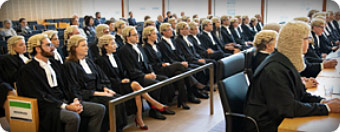
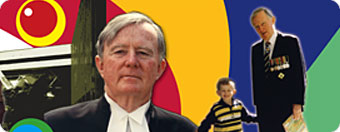
 THE CHIEF JUSTICE
THE CHIEF JUSTICE His brilliant career at the Bar spanned 28 years from 1949 and was characterised by intellectual and lawyerly eminence. Apart from a host of extringent commitments of Parliament, the Military, the Arts, he served as President of the Bar Association of Queensland, of the Australian Bar Association and of the Law Council of Australia.
His brilliant career at the Bar spanned 28 years from 1949 and was characterised by intellectual and lawyerly eminence. Apart from a host of extringent commitments of Parliament, the Military, the Arts, he served as President of the Bar Association of Queensland, of the Australian Bar Association and of the Law Council of Australia. Described as a Supreme Court Judge, politician and soldier, Peter Connolly had a diverse and impressive life dedicated to public service. Justice Connolly’s distinguished career began upon his return to Australia after service overseas in the Middle East, the Pacific and Southeast Asia during the Second World War. Peter Connolly returned to university in 1946 and studied law. He graduated with First Class Honours in 1948 winning the University Medal in Law. Before his graduation, he was appointed a lecturer in Constitutional Law at the University of Queensland. He was admitted to the Queensland Bar in 1949, and took silk in 1963.
Described as a Supreme Court Judge, politician and soldier, Peter Connolly had a diverse and impressive life dedicated to public service. Justice Connolly’s distinguished career began upon his return to Australia after service overseas in the Middle East, the Pacific and Southeast Asia during the Second World War. Peter Connolly returned to university in 1946 and studied law. He graduated with First Class Honours in 1948 winning the University Medal in Law. Before his graduation, he was appointed a lecturer in Constitutional Law at the University of Queensland. He was admitted to the Queensland Bar in 1949, and took silk in 1963.
 Through his military service, his election as a Member of the Queensland Parliament, and his distinguished judicial career, Peter Connolly’s life was one of committed public service.
Through his military service, his election as a Member of the Queensland Parliament, and his distinguished judicial career, Peter Connolly’s life was one of committed public service.
